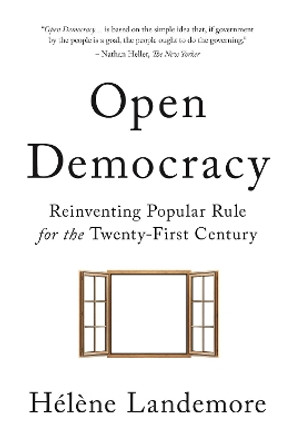Description
"Open Democracy envisions what true government by mass leadership could look like."-Nathan Heller, New Yorker
How a new model of democracy that opens up power to ordinary citizens could strengthen inclusiveness, responsiveness, and accountability in modern societies
To the ancient Greeks, democracy meant gathering in public and debating laws set by a randomly selected assembly of several hundred citizens. To the Icelandic Vikings, democracy meant meeting every summer in a field to discuss issues until consensus was reached. Our contemporary representative democracies are very different. Modern parliaments are gated and guarded, and it seems as if only certain people-with the right suit, accent, wealth, and connections-are welcome. Diagnosing what is wrong with representative government and aiming to recover some of the lost openness of ancient democracies, Open Democracy presents a new paradigm of democracy in which power is genuinely accessible to ordinary citizens.
Helene Landemore favors the ideal of "representing and being represented in turn" over direct-democracy approaches. Supporting a fresh nonelectoral understanding of democratic representation, Landemore recommends centering political institutions around the "open mini-public"-a large, jury-like body of randomly selected citizens gathered to define laws and policies for the polity, in connection with the larger public. She also defends five institutional principles as the foundations of an open democracy: participatory rights, deliberation, the majoritarian principle, democratic representation, and transparency.
Open Democracy demonstrates that placing ordinary citizens, rather than elites, at the heart of democratic power is not only the true meaning of a government of, by, and for the people, but also feasible and, today more than ever, urgently needed.
About the Author
Helene Landemore is associate professor of political science at Yale University. She is the author of Democratic Reason (Princeton) and Hume. Twitter @landemore
Reviews
"Finalist for the North American Society for Social Philosophy Book Award"
"Open Democracy envisions what true government by mass leadership could look like. Her model is based on the simple idea that, if government by the people is a goal, the people ought to do the governing."---Nathan Heller, New Yorker
"A great defence of both sortition and deliberation as complements to representative democracy."---Pratap Bhanu Mehta, Open Magazine
"A bold exploration of how we can move beyond a purely electoral conception of democratic representation. Using normative democratic theory and real-world examples of innovations in citizen representation, Helene Landemore argues for a vision of democracy that is more faithful to popular rule, more likely to tap into democratic reason, and more stable and durable than electoral democracy."---Erica Yu, Erasmus Journal for Philosophy and Economics
"Ambitious. . . . A scheme that breaks with two liberal-democratic institutions that are usually taken for granted: elections and political parties."---Jan-Werner Mueller, Project Syndicate
"[Landemore] argues that we need a new, more inclusive system of governance that is less elitist and more participatory to cure what ails democracy." * The Nation *
"A fascinating, wide-ranging book."---Rachael Walsh, International Journal of Constitutional Law
"Important."---Christopher Kutz, Los Angeles Review of Books
Book Information
ISBN 9780691181998
Author Helene Landemore
Format Hardback
Page Count 272
Imprint Princeton University Press
Publisher Princeton University Press







